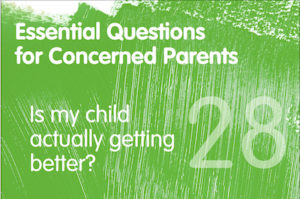 If you’ve tried to help your child in some way, whether via a traditional psychiatric intervention or via something else, the next question to address is whether your child is getting better, whether the situation remains unchanged, or whether your child’s situation has worsened.
If you’ve tried to help your child in some way, whether via a traditional psychiatric intervention or via something else, the next question to address is whether your child is getting better, whether the situation remains unchanged, or whether your child’s situation has worsened.
It seems as if this should be easy to gauge but in fact it isn’t really that easy. Multiple studies have shown that if a child is being prescribed psychiatric medication, both parents and teachers will report that the child is doing much better, even if there’s no observable change. Perception gets significantly mixed with reality when it comes to judging whether or not our child is faring better. And is “doing better” all that ought to concern you, given that the long-term negative effects of psychiatric chemicals may not appear immediately? Is your child doing better in the moment at the cost of doing more poorly down the road? And what does “better” even mean, for instance when it comes to sedating an active child?
Say that your child is placed on so-called psychiatric medication and his or her situation worsens. You will then be faced with the following very difficult questions. Is your child’s condition actually worsening and is the so-called medication proving ineffective (and therefore perhaps ought to be changed or increased, which is likely what your child’s psychiatrist will recommend)? Or is it the case that the so-called medication is actually causing the worsening (there is ample evidence that this can happen)? If your child’s situation doesn’t improve you are caught in the predicament of trying to figure out what’s going on with your child while also needing to appraise the effectiveness or dangerousness of the help being offered your child.
*****
Read the Concerned Parents’ Project Introductory Post
To get in touch or to share your feedback, please email us
Read more on this topic
Excellence in Mental Health Care
Visit Parent Resources for additional in-depth articles














